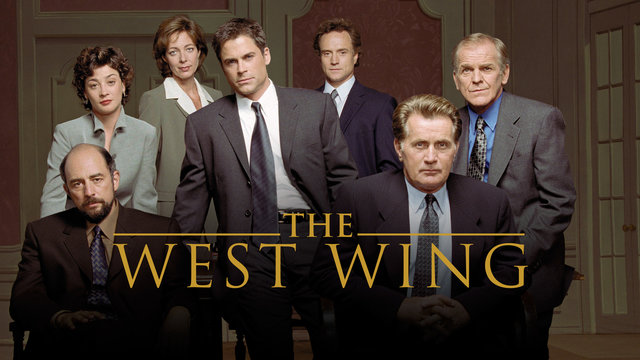Introduction:
“The West Wing,” a masterful creation by Aaron Sorkin, stands as a paragon of political television dramas that transcends entertainment to become a cultural touchstone. Airing from 1999 to 2006, the series not only provided a fictionalized glimpse into the inner workings of the White House but also sparked dialogues on politics, governance, and the ideals that define American democracy. In this comprehensive exploration, we will delve into the brilliant narrative, complex characters, thematic depth, and enduring impact that make “The West Wing” a timeless beacon in the television landscape.
The Presidential Symphony:
1. Premise and Setting:
“The West Wing” unfolds within the hallowed halls of the West Wing of the White House, offering viewers a fictionalized look at the inner workings of the presidency under President Josiah Bartlet. The series navigates the complexities of political decision-making, policy implementation, and the personal lives of those who serve at the highest echelons of government.
2. President Josiah Bartlet (Martin Sheen):
President Bartlet, portrayed by Martin Sheen, embodies the idealistic, intellectual leader grappling with the weight of the presidency. His character serves as the moral compass of the series, balancing the demands of governance with personal principles.
3. The West Wing Staff:
The ensemble cast, including characters like Josh Lyman (Bradley Whitford), Toby Ziegler (Richard Schiff), C.J. Cregg (Allison Janney), Sam Seaborn (Rob Lowe), and Leo McGarry (John Spencer), form the dynamic team supporting President Bartlet. Each character contributes to the tapestry of the West Wing’s political symphony.
Sorkin’s Signature Dialogue:
1. Rapid-Fire Dialogue:
Aaron Sorkin’s distinct writing style, characterized by rapid-fire dialogue, walk-and-talk scenes, and intellectual banter, became a hallmark of “The West Wing.” The dialogue not only provided an engaging narrative rhythm but also elevated the series to a realm of intelligent and compelling storytelling.
2. Idealism and Optimism:
“The West Wing” is steeped in idealism and optimism, presenting a vision of politics where intellect, integrity, and a commitment to public service triumph over cynicism. The characters’ impassioned speeches and intellectual debates contributed to the show’s enduring appeal.
3. Sorkin’s Departure and Transition:
After four seasons, Aaron Sorkin departed the series, leading to a transition in the show’s tone and approach. While the series continued to maintain its high-quality storytelling, the departure marked a significant shift in the show’s narrative dynamics.
Thematic Depth and Story Arcs:
1. Political Issues:
“The West Wing” delved into a myriad of political issues, ranging from foreign policy and national security to domestic concerns like healthcare, education, and social justice. The series tackled these subjects with a level of nuance and complexity rarely seen in mainstream television.
2. Moral and Ethical Dilemmas:
The characters often grappled with moral and ethical dilemmas, presenting a realistic portrayal of the challenges inherent in political decision-making. The show encouraged viewers to contemplate the complexities of governance and the compromises necessary in the pursuit of public service.
3. Election Campaigns and Transitions:
The series depicted two presidential election campaigns and transitions, providing a dynamic backdrop for exploring the political landscape and the impact of leadership changes on both personal and professional relationships.
Awards and Critical Acclaim:
1. Emmy Success:
“The West Wing” achieved remarkable success at the Primetime Emmy Awards, winning multiple accolades, including Outstanding Drama Series, Outstanding Writing, and Outstanding Lead Actor for Martin Sheen.
2. Critical Acclaim:
The series received widespread critical acclaim for its exceptional writing, ensemble cast performances, and its ability to engage audiences in complex political discourse. It remains a benchmark for quality television in the political drama genre.
3. Legacy and Cultural Impact:
“The West Wing” left an enduring legacy, shaping public perceptions of the presidency and influencing subsequent political dramas. Its impact extended beyond the screen, inspiring discussions on governance, civic duty, and the role of idealism in politics.
Challenges and Enduring Legacy:
1. Post-Sorkin Era:
Following Aaron Sorkin’s departure, “The West Wing” faced the challenge of maintaining its narrative brilliance. While the subsequent seasons continued to garner praise, the absence of Sorkin’s distinct voice left an indelible mark on the series.
2. Continued Relevance:
Despite its initial run concluding in 2006, “The West Wing” continues to resonate with audiences, gaining new viewers through streaming platforms. Its themes of leadership, public service, and the pursuit of a better America remain relevant in the ever-evolving political landscape.
3. Influence on Political Discourse:
The series’ impact extends beyond entertainment, influencing political discourse and inspiring individuals to engage in civic participation. Its portrayal of principled leadership and the pursuit of a more just society contributes to ongoing conversations about the American political ethos.
Conclusion:
“The West Wing” stands as a testament to the power of storytelling to engage, inspire, and provoke thought. Through its idealistic lens, complex characters, and intellectual dialogue, the series left an indelible mark on television history. As viewers traverse the hallowed halls of the West Wing alongside President Josiah Bartlet and his dedicated staff, they embark on a journey that transcends political drama, inviting reflection on the ideals that shape the American experiment in democracy. In the annals of television greatness, “The West Wing” remains a shining example of the transformative potential of storytelling to elevate and enrich our understanding of the world we inhabit.
